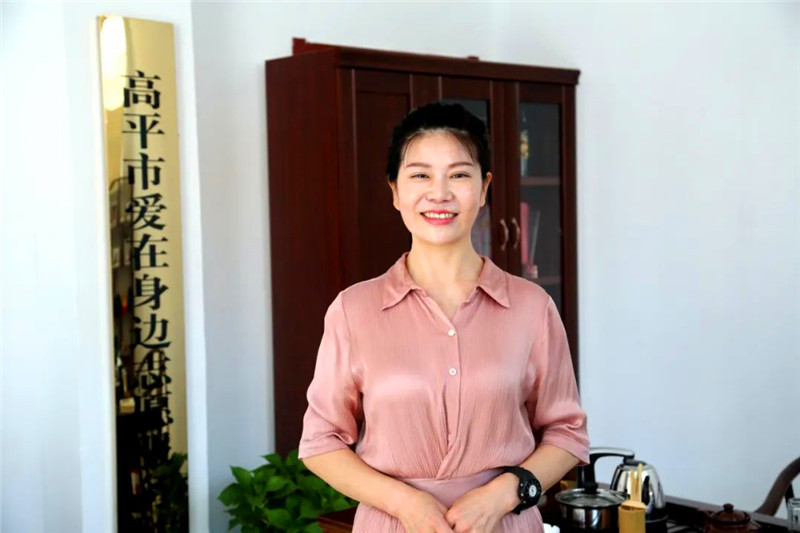Le Dang Mazu Culture "Ferryman" -The Fujian story of Taiwan compatriots Lin Mengrong
Author:Putian released Time:2022.08.18

Lin Mengrong studied the topic in the office.
"The drum lantern in the first month, the peanuts in February, the bean sprouts in March, the hemp tea was sold in April, and the crickets were bound in May ..." This summer, Lin Mengrong did not return to Taiwan, but rushed to the subject. If she is interested in "Fu" culture and cross -strait folklore, she has been busy walking into the village to enter the temple in Putian, collecting and recording the festival customs of the age of Fujian and Taiwan. For future teaching research.
"Speaking for Mazu"
"The original idea of my coming to Putian was to do Mazu culture." Lin Mengrong, from Taipei, Taiwan, coached Minfu in 2018 and joined the Mazu Culture Research Institute of Putian College.
"The fate of Mazu and I was amazing." In 2008, Lin Mengrong learned that Taiwan Miaoli wanted to do the Mazu Mazu in the border in the incense activities, so he was determined to experience the folk customs of Taiwan's "March 'Mad" Mazu in March. Lin Mengrong followed Mazu's sedan to the Beigang Chaotian Palace all the way. The two -day and one -night pilgrimage journey brought her a lot of touch.
Ten years later, the "Mazu Yuan" again tightly connected her with the "Mazu hometown". "I did not expect to come to Putian ten years later. I am very grateful." In 2018, Fujian issued "66 measures to benefit Taiwan compatriots" and issued a "recruiting order" to Taiwanese teachers. Soon, Lin Mengrong submitted his resume to Putian College, and the latter quickly agreed to hire.
"Meizhou Mazu Temple is a holy place in the hearts of thousands of faithful people in Taiwan. Mazu culture is an important link to connect compatriots on both sides of the strait." After entering, she has been busy with Mazu culture, often running to Meizhou Island, or participating in the Straits Forum event activities , Or participate in the Mazu Sea Festival, or take students to investigate.
"Mazu culture is an important part of the excellent traditional culture of China. I vowed to make a statement for Mazu. As long as I have a little strength, I will write it." In Lin Mengrong, Mazu's life and morality have not left. What she wants to do is to spread the Mazu culture with the spiritual connotation of "standing virtue, doing good, big love", and driving more young people on both sides of the strait to inherit.
"From a piece of white paper to the rainbow"
In 2019, Lin Mengrong's subject "The Research on Mazu Culture and Maritime Economic and Trade Relations in the" Belt and Road "vision of Taiwan successfully applied for the National Social Science Fund project. "The mainland attaches great importance to the scientific research work of Taiwanese teachers. There are also many preferential policies in Fujian. Research on the fields of Mazu culture, folklore beliefs, national history and other fields encourage us to actively apply for topics."
In Taiwan, Mazu has exceeded 16 million people, exceeding 2/3 of the population of Taiwan. "Mazu's vulgar cultural broadcast path shows that the same roots of the same roots on both sides of the strait are all family." Lin Mengrong returned to Baodao for field investigation as soon as he had time to study the process of Mazu's vulgar platform and spread the path. "At least one room is inspected every day Gongmiao, interview with the villagers to understand the influence of Mazu's faith in the changes in Taiwan's social and cultural changes. "
With the deepening of the visit, there are hundreds of Taiwan Palace Temples that Lin Mengrong "punch in". From the north coast of Taiwan to the central and southern parts, the material is getting thicker and thicker.
Miaoli Ciyu Palace is one of the Mazu Temples in Taiwan. Lin Mengrong found that "the early economic development of Taiwan was closely related to Mazu's vulgarity, and Mazu Temple was a business center of the regional economy." It turned out that in the early days of Fujian and Taiwan, the ferry was very enthusiastic. With the Mazu Temple as the center, many parts of Taiwan gradually emerged from docks, bazaars, and Yidu. "Mazu culture plays an important role in cross -strait business exchanges. From this perspective, Mazu culture is the embodiment of the same roots of both sides of the strait."
The "blessing" culture is also the topic of Lin Mengrong. "My Grandpa is Lin Fushou, and the uncle is Lin Fuquan. They are born in Quanzhou, Fujian.
In Fujian and Taiwan, there are many festivals and customs with rich "blessings" culture. Lin Mengrong is planning to write a work. "This is the spring flowers, touches spring cattle, radish cake ..." Lin Mengrong showed reporters to show the tens of thousands of photos of the recording of Fujian and Taiwan. Pray for blessings. Insert a pair of spring flowers on the meal, which means good things to become, are also a "blessing 'culture."
"'Fu" culture can also be seen everywhere in Mazu on both sides of the strait. "Lin Mengrong said that in the Putian Mazu Palace Temple," blessing "is a noodle line or porridge for the believers to" eat safe ". The meaning of blessing is also symbolized in Taiwan's folk customs; the Taiwanese people brought "blessings" to the temple to worship Mazu in the first and fifteenth day of the lunar calendar.
In the past four years in Fujian, Lin Mengrong's academic achievements have excellent academic performance, and her heart is abundant and content. "When I came, it was a piece of white paper, and now there are rainbow appear!"
"There is a big thousand between square inches"
In addition to doing research, Lin Mengrong usually gives students lessons, mainly Sanchuang and Mazu culture courses.
Putian College has a "Mazu class", which mainly cultivates applied Mazu culture to spread talents. Lin Mengrong's teaching methods are not restricted, and they are well received by students. "I will take students to the village skewers, visit Mazu Palace Temple, Cultural and Creative Enterprises, inspect folk customs on the spot, convey the connotation of Mazu culture to students, and help everyone learn the skills of Mazu activities, industrial management and other skills."
Behind teaching is a deep love for the land under the feet."In addition to learning Putian, I am used to my life. I also like to eat noodles and fried rice noodles." Similar climates, diets, and customs in Thailand made Lin Mengrong fall in love with this city unknowingly and witnessed it.Development changes."Based on the school as the home, eat in the cafeteria, and have a school bus to get off work, it is very happy." On weekdays, Lin Mengrong lives in a school -assigned apartment. Life is simple and simple, so that she can free up more time and energy to focus on love. Study."I don't need to do much in the residence. I believe that there are many thousands of squares, aspirations, and no far -fel." For Lin Mengrong, to do research on the heart, it is the most important thing for the "ferry" on cross -strait culture.
(Source: Fujian Daily Reporter: Liu Shenkui intern: Song Weihong text/picture editor: Zhou Chen)
- END -
Actions speak louder than words!"Good Shanxi" Zhang Xiurong, OK!

Shanxi Good Man Zhang Xiurong is the chairman of the volunteer service team of Gao...
Some subway stations in Chengdu Chenghua District suspended operational services

The reporter learned from the Chengdu Metro that according to the needs of the new...